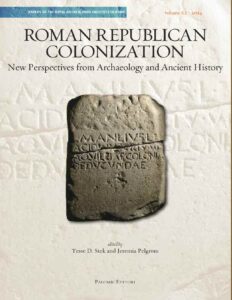 Roman colonization has been seen as a primary model for colonization and colonialism in more recent historical periods. The direct relevance of Roman colonization to wide-ranging historical interpretations and to the self-perception of modern nation-states and empires explains the continuing fascination exerted by Roman colonization in both academic and non-academic circles. Trying to unravel the character and development of the key phase of Roman colonization in the Roman Republican period is therefore essential, not only for ancient history, archaeology, and related disciplines, but also for a better understanding of the modern world. The most comprehensive study on Roman colonization remains Edward Togo Salmon’s Roman Colonization under the Republic (1969). In the almost 50 years since the publication of Salmon’s seminal book many crucial revisions have been proposed for different aspects of the traditional view of Roman colonization. Despite the obvious importance of these new studies, their impact on our general understanding of Roman colonization and their deeper significance for understanding Roman imperialism has yet to be fully appreciated. The increasing fragmentation of the research field is an important reason that an overarching, radically new, understanding of Roman republican colonization has not, as yet, been brought forward. Issues that are central to the character of Roman colonization are studied in separate disciplines including Roman historiography, urban archaeology, architecture studies, landscape archaeology, Roman religion studies and Roman law. This volume brings together recent insights from a range of different academic traditions, lifting language and cultural barriers. By presenting both new theoretical insights and new archaeological discoveries, it explores the potentially productive interplay between different emerging research areas that are currently isolated.
Roman colonization has been seen as a primary model for colonization and colonialism in more recent historical periods. The direct relevance of Roman colonization to wide-ranging historical interpretations and to the self-perception of modern nation-states and empires explains the continuing fascination exerted by Roman colonization in both academic and non-academic circles. Trying to unravel the character and development of the key phase of Roman colonization in the Roman Republican period is therefore essential, not only for ancient history, archaeology, and related disciplines, but also for a better understanding of the modern world. The most comprehensive study on Roman colonization remains Edward Togo Salmon’s Roman Colonization under the Republic (1969). In the almost 50 years since the publication of Salmon’s seminal book many crucial revisions have been proposed for different aspects of the traditional view of Roman colonization. Despite the obvious importance of these new studies, their impact on our general understanding of Roman colonization and their deeper significance for understanding Roman imperialism has yet to be fully appreciated. The increasing fragmentation of the research field is an important reason that an overarching, radically new, understanding of Roman republican colonization has not, as yet, been brought forward. Issues that are central to the character of Roman colonization are studied in separate disciplines including Roman historiography, urban archaeology, architecture studies, landscape archaeology, Roman religion studies and Roman law. This volume brings together recent insights from a range of different academic traditions, lifting language and cultural barriers. By presenting both new theoretical insights and new archaeological discoveries, it explores the potentially productive interplay between different emerging research areas that are currently isolated.
Roman Republican Colonization: New Perspectives from Archaeology and Ancient History

